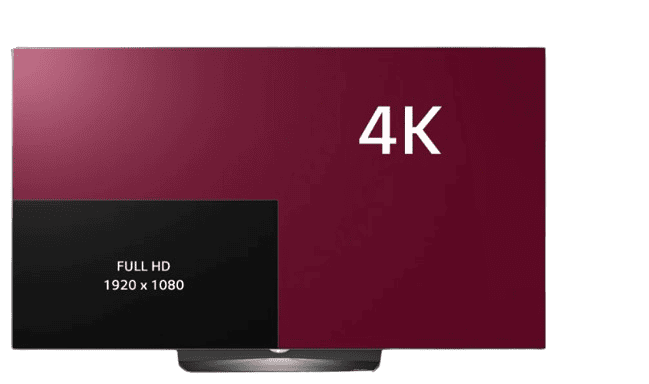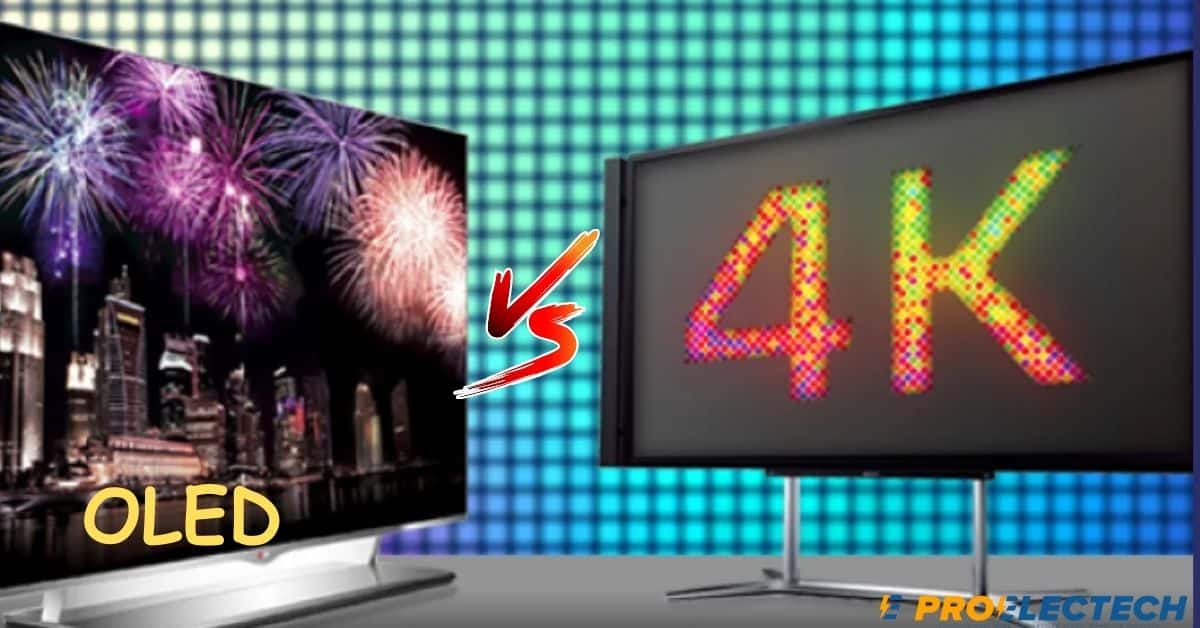The best choice between a 4K and OLED TV depends on your preferences for resolution or picture quality. OLED TVs offer superior contrast and deep blacks, while 4K sets prioritize higher resolution.
Choosing between a 4k or oled TV often hinges on what you value most in your viewing experience. OLED TVs are renowned for their exceptional contrast ratios and the ability to deliver true blacks, thanks to their ability to completely turn off pixels.
On the other hand, 4K televisions excel by offering a significantly higher resolution, which results in clearer, sharper images, especially on larger screens or when sitting closer to the TV.
With an OLED TV, viewers enjoy a wider viewing angle and a more vibrant color range—even in well-lit rooms. Meanwhile, 4K TVs are generally more budget-friendly and provide a wide range of size options, making them a versatile choice for various living spaces.
Ultimately, the decision should reflect your use-case scenarios, whether they emphasize cinematic immersion or detailed clarity.

The Allure Of High-definition: 4k And Oled Tvs
In a world where visual fidelity is king, 4K and OLED TVs reign supreme.
With their stunning clarity and vibrant colors, these TVs transform living rooms into theaters. The quest for the most lifelike picture drives the industry forward,
presenting a timeless debate: 4K or OLED, which is best? This section delves into each technology, enlightening consumers on the marvels of modern television.
The Quest For The Perfect Picture
4K TVs deliver an enormous increase in resolution. This means sharper images, finer details, and a more immersive viewing experience.
OLED TVs, on the other hand, pride themselves on contrast ratios that are as striking as real life. Blacks are deeper, and colors pop with an unmatched intensity.
- 4K TV Features:
- Huge resolution (four times that of Full HD)
- Clear, sharp images even on large screens
- Widely available content
- OLED TV Features:
- Perfect blacks for contrast levels
- Exceptional color accuracy
- Wide viewing angles with no loss in quality
The Evolution Of TV Technology
Television technology is ever-evolving. From the bulky CRTs of yesteryear to the modern slim and sleek displays, each innovation has aimed at enhancing the viewing experience. 4K and OLED are the fruits of this advancement.
4K TVs became the new standard for those seeking high-definition content. OLED technology took this a step further by revolutionizing color and light control at the pixel level. This table breaks down the evolutionary perks of both technologies:
| Feature | 4K | OLED |
|---|---|---|
| Resolution | 3840×2160 pixels | Varies, but with superior pixel control |
| Contrast | High | Highest possible |
| Color Accuracy | Great | Exceptional |
| Viewing Angles | Good | Excellent |
To select the right TV, consider personal preferences and room environments. A 4K TV might be the choice for those valuing resolution while an OLED could capture hearts with its unmatched contrast.
4k Tv Defined: Resolution Like No Other

4K TV unlocks a world of extraordinary clarity. Each image bursts with detail. It’s a leap beyond High Definition, offering four times the resolution for a visual experience only dreamed of until recently.
Pixel Power: Understanding 4K Resolution
Pixel Power: Understanding 4k Resolution
A 4K TV, also known as Ultra High Definition (UHD), boasts a resolution of 3840 x 2160 pixels. That’s over 8 million pixels on the screen. To put this into perspective:
- HD TVs have about 2 million pixels.
- 4K TVs have more than 8 million pixels.
This density means sharper images, smoother lines, and finer details. The result is as close to reality as your screen can get.
Content Availability for 4K
Content Availability For 4k
Having a 4K TV means you’ll want content that reveals its potential. Here’s the good news:
- Streaming services like Netflix and Amazon Prime Video offer 4K content.
- Live sports and events are increasingly broadcast in 4K.
- Ultra HD Blu-ray discs and players bring 4K movies home.
Content creators are steadily embracing 4K, ensuring more 4K material becomes available. Remember, a robust internet connection is key for streaming 4K content without buffering.
Oled Tv Unveiled: The Pinnacle Of Contrast And Color
OLED TVs are trailblazers in the realm of television technology. They offer unmatched contrast and color. Each pixel emits its own light. This means deep blacks and vibrant colors.
It’s a feast for the eyes. The 4K resolution complements this. It provides stunning detail. The debate rages on. Yet, many agree that OLED TVs sit at the apex of picture quality.
How Oled Enriches Viewing Experience
- Self-Lit Pixels: Each pixel on an OLED screen illuminates independently. This produces true blacks and a fantastic contrast ratio.
- Wide Color Spectrum: OLED displays portray a wide range of colors. This enhances the realism of the images.
- Faster Refresh Rates: Smooth motion is key in fast-paced scenes. OLED screens excel here with low response times.
- Great Angles: View the screen from any angle without losing quality. OLED maintains consistent color and brightness.
The Price Of Perfection: Is Oled Worth It?
The cost of OLED TVs is higher than standard LED ones. Yet, many argue that the cost is justified. The viewing experience is unparalleled.
Plus, prices are dropping as technology becomes more common. For the discerning viewer, investing in an OLED TV could be the right choice.
| OLED TV Pros | OLED TV Cons |
|---|---|
| Exceptional contrast and color | Higher initial cost |
| True blacks | Risk of burn-in on display |
| Uniform brightness and color | Longevity concerns compared to LED |
| Viewing angles superiority | Limited brightness compared to LED |
In the end, whether an OLED TV is worth the investment depends on priority. High contrast, color accuracy, and viewing angles? If yes, then OLED could be the best choice.
For those on a budget or with concerns over screen burn-in, alternatives such as 4K LED may be better suited. Each person’s needs are unique. Choose what fits best with your lifestyle and viewing habits.
Comparing The Giants: 4k Vs Oled

In the world of television technology, two titans dominate the market: 4K and OLED TVs. Buyers often find themselves at a crossroads, trying to decide which technology will give them the best viewing experience.
It’s a clash of resolution versus display quality, each with its strong suit. Let’s dive into a detailed comparison of these two giants.
Head-to-head: Display Technology
4K TVs boast a resolution with four times the pixels of Full HD, resulting in sharper and crisper images. The term 4K refers to the resolution, so these TVs can come with various display technologies like LED, QLED, or even OLED.
In contrast, OLED TVs focus on display quality. They feature Organic light-emitting diodes that produce light and color from within, allowing for incredible contrast levels and perfect black shades. This technology does not focus on resolution, but rather on the overall picture quality.
To sum up:
- 4K TV: Superior resolution, flexible display technology options.
- OLED TV: Unmatched contrast, true blacks, and vibrant colors.
Price Tag Battles: Affordability And Value
Price is a decisive factor for many consumers. 4K TVs come in a broad price range, often making them more accessible. The cost varies depending on brand, display technology, and additional features.
Meanwhile, OLED TVs are typically on the higher end of the price spectrum. The unique display technology of OLED often results in a premium price tag.
Here’s a comparison for quick reference:
| TV Type | Price Range | Value for Money |
|---|---|---|
| 4K TV | Wide, from budget-friendly to high-end | Good resolution, varied options |
| OLED TV | Typically premium | Exceptional picture quality, premium feel |
Size And Scale: Finding The Right Fit For Your Living Space
Size and scale: Finding the Right Fit for Your Living Space can often make or break your viewing experience.
Whether you’re drawn to the pristine detail of 4K or the deep blacks and vibrant colors of OLED, the physical size of your new TV is a crucial factor to consider. Getting the right fit means balancing your room’s dynamics with the immersive experience you’re craving.
Big Screens And Living Room Dynamics
Big screens make movies and shows more immersive. They can also change your room’s look and feel. Before buying, think about these points:
- Room size: Ensure the TV is proportional to the room.
- Viewing distance: Sit far enough to enjoy the whole screen without moving your head.
- Furniture placement: Arrange seating for a clear, unobstructed view.
- Wall space: Leave space around the TV to avoid a cramped look.
Does Size Matter For 4k And Oled?
The short answer is yes. With 4K, you’ll want a bigger screen to appreciate the extra pixels. This is what you should know:
| 4K TVs | OLED TVs |
|---|---|
| Larger screens show more detail. | Any size screen displays deep blacks. |
| Bigger is better for 4K clarity. | Screen size does not affect color quality. |
Remember, a 4K TV over 50 inches is ideal for most homes. OLED TVs look great in all sizes. Your choice should depend on room size and viewing habits.
Durability And Lifespan: Long-term Television Investment
Choosing a TV is a big decision. We all want a TV that lasts. Durability and lifespan matter. A good TV should last for many years. Both 4K and OLED TVs have pros and cons. Let’s explore how they hold up over time.
Warranty And Repair Considerations
When buying a TV, check the warranty. A longer warranty can mean a more durable TV. Both 4K and OLED TVs usually offer a one-year warranty. Some brands give extended warranties.
Repairs on OLED can be pricier than on 4K. OLED screens are special and cost more to fix. Here are some points to consider:
- Look for TVs with longer standard warranties
- Check for extended warranty options
- OLED repairs might cost more
- Consider the brand’s reputation for durability
Life Expectancy Of 4k And Oled Tvs
OLED TVs give stunning pictures. But they might not last as long as 4K TVs. The organic materials in OLEDs can degrade. This could lead to burn-in with time.
On the other hand, 4K TVs use LEDs. LEDs can last longer. Most 4K TVs last for about seven years. OLEDs can last a similar time if well cared for. Here are key lifespan points:
| TV Type | Expected Lifespan |
|---|---|
| 4K LED TV | Up to 100,000 hours |
| OLED TV | Up to 100,000 hours |
Each TV can be a smart choice. Think about how long you want your TV to last. Remember, proper care can extend a TV’s life.
Connectivity And Smart Features: Beyond Picture Quality
When choosing between a 4K and OLED TV, smart features play a critical role. With both boasting excellent picture quality, it’s the connectivity options and smart functions that enhance your viewing experience.
Features such as voice control, app availability, and integration with other smart home devices can significantly tilt the scales. Let’s explore how these aspects influence the best choice for your home entertainment setup.
Streaming And Smart Home Integration
Seamless streaming is crucial for any modern TV.
- 4K TV: Offers a wide range of apps and services.
- OLED TV: Often includes premium smart features.
Both 4K and OLED TVs generally come with built-in Wi-Fi and Ethernet ports, allowing you to connect to your favorite streaming platforms.
Voice controls and mobile-app compatibility enhance usability, letting you command your TV or cast content from your devices.
Smart home enthusiasts will appreciate TVs that smoothly integrate with devices like smart lights or thermostats. Check if the TV supports systems like Apple HomeKit, Google Assistant, or Amazon Alexa for a connected home experience.
Future-proofing Your Tv Choice
Technology advances rapidly, making future-proofing an essential factor.
| Feature | 4K TV | OLED TV |
|---|---|---|
| Resolution | High | Very High |
| HDMI Ports | Often 4 or more | Often 4 or more |
| Software Updates | Regular | Regular |
Look for TVs with multiple HDMI 2.1 ports to accommodate future devices. Check the update policy of the manufacturer to ensure your TV’s software stays current.
Both 4K and OLED TVs are good choices here, but OLEDs might have an edge with their superior contrast ratios and black levels, keeping the picture quality top-notch for years to come.
The Verdict: Choosing What’s Best For You
Deciding between a 4K and an OLED TV feels like a tech tug-of-war. Both bring fascinating benefits to your screen. One shines with unparalleled clarity, while the other dazzles with vibrant colors and deep blacks. Let’s get to the bottom of this and help you pick the right TV.
Balancing Budget And Desires
4K TVs are known for their stunning resolution. They offer four times the detail of Full HD. The best part? Their prices are dropping. TV lovers appreciate getting top-notch quality without emptying wallets.
On the flip side, OLED TVs are the luxury liners. They boast perfect blacks and impressive contrast. The cost is higher, but so is the visual benefit. It’s a price vs. performance debate.
| Feature | 4K TV | OLED TV |
|---|---|---|
| Resolution | 4K (High) | Varies (Often High) |
| Price | More affordable | More expensive |
| Picture Quality | Excellent | Outstanding |
The Role Of Personal Viewing Habits
Your choice also depends on how you watch TV. Do bright rooms light up your life? A 4K TV handles glare well.
Prefer movies in the dark? OLED’s deep blacks shine here. It’s all about finding the sweet spot that fits your daily routine.
- 4K TV:
- Better in bright environments
- Good all-rounder
- OLED TV:
- Superior for dark room viewing
- Extraordinary contrast and color
Think about your viewing pleasure. Do you binge-watch shows? Love gaming sessions? Or settle in for movie marathons? Your habits guide your choice.
Frequently Asked Questions For 4k Or Oled TV
Is 4k Resolution Better Than Oled?
4K refers to screen resolution (3840 x 2160 pixels), while OLED is a screen technology that offers high contrast and color. Preferences depend on individual viewing priorities.
Can Oled Tvs Display 4k Content?
Yes, many OLED TVs support 4K content, combining the advantages of both high resolution and quality screen technology for an immersive viewing experience.
What’s The Lifespan Of Oled Tvs Vs 4k Leds?
OLED TVs offer around 100,000 hours of lifespan, similar to 4K LED TVs, but their pixels can dim over time due to organic material usage.
Do 4k Oled TVs Have Better Color Accuracy?
OLED TVs are renowned for their excellent color accuracy and deep blacks, as each pixel emits its light, providing vibrant and precise colors.
Which Consumes More Power: 4k Or Oled?
OLED screens generally consume less power than conventional 4K LED TVs, as they don’t require backlighting, and individual pixels can turn off completely.
Are Oled Tvs More Expensive Than 4k Tvs?
OLED TVs tend to be more expensive than standard 4K TVs due to the advanced technology that offers superior contrast ratios and color depth.
How Does Screen Burn-in Compare Between 4k And Oled?
Screen burn-in is more of a concern for OLED TVs, as the organic compounds can degrade over time, while 4K LED screens are less susceptible to this issue.
What’s The Best Choice For Gaming: 4k Or Oled?
OLED TVs often have faster response times and better visuals, making them a great choice for gaming, though some 4K TVs also offer excellent gaming features.
Are All 4k Tvs Oled?
No, 4K is a resolution and isn’t exclusive to OLED TVs. There are various types of 4K TVs using different technologies, including LED, QLED, and others.
Which Provides Better Viewing Angles: 4k Or Oled?
OLED TVs typically offer wider viewing angles without loss of color accuracy or contrast, compared to standard 4K LED TVs, making them better in this aspect.
Is OLED better than 4K?
OLED and 4K are complementary technologies. OLED refers to a display technology known for its high contrast and deep black levels, while 4K describes a resolution of approximately 4000 pixels horizontally. An OLED TV can also be 4K in resolution, offering both advanced display technology and high resolution.
Which is better 4K or QLED or OLED?
The choice between 4K, QLED, and OLED depends on individual preferences and use cases. QLED, with its quantum dot technology, excels in brightness and color volume, making it ideal for well-lit rooms. OLED, on the other hand, offers superior contrast ratios and true blacks, perfect for dark viewing environments. Both can offer 4K resolution for sharp and detailed images.
Is OLED worth the extra money?
For many, the exceptional contrast ratios, true blacks, and viewing angles make OLED worth the extra investment, especially for enthusiasts and those who prioritize immersive viewing experiences.
What are the disadvantages of OLED TV?
OLED TVs may experience burn-in over time with static images, have generally lower brightness than QLED displays, and are more expensive on average.
What is the most common problem with OLED TV?
The most common problem reported with OLED TVs is screen burn-in, where remnants of static display elements become permanently visible.
Do we really need OLED TV?
The necessity of an OLED TV depends on the value one places on high-quality visual experiences. For cinephiles, gamers, and those who crave the ultimate contrast and color depth, an OLED TV can be a worthwhile investment.
What is the lifespan of an OLED TV?
The lifespan of an OLED TV is typically around 100,000 hours, after which the brightness of the display may start to decrease gradually.
What is the drawback of LG OLED TV?
While LG OLED TVs are lauded for their exceptional picture quality, a potential drawback is their susceptibility to burn-in with prolonged exposure to static images.
What is the lifespan of OLED?
The lifespan of an OLED display is generally estimated to be about 100,000 hours before the brightness begins to decrease.
Is it OK to leave OLED TV on all day?
Leaving an OLED TV on all day is not recommended, as prolonged exposure to static images can increase the risk of burn-in.
Can OLED last 10 years?
Yes, an OLED can last 10 years or more with typical usage patterns, assuming a daily usage of about 8 hours.
Do OLED TVs burn out fast?
OLED TVs do not “burn out” quickly, but they can experience burn-in from static images if those are displayed excessively and frequently over time.
Can I leave my OLED TV on overnight?
It is advisable not to leave your OLED TV on overnight to prevent the risk of burn-in and to conserve electricity.
Do OLED screens get worse over time?
OLED screens can degrade over time, with the potential for burn-in and a decrease in brightness after extensive use.
Does an OLED TV use a lot of electricity?
OLED TVs are generally energy-efficient, but their consumption can vary based on brightness settings and screen size.
Why do OLED TVs cost so much?
The cost of OLED TVs reflects the complex manufacturing process, superior picture quality, and technology used to produce the deep blacks and vibrant colors characteristic of OLED displays.
Which type of TV is most energy efficient?
LED TVs are typically the most energy-efficient, followed closely by OLED TVs, which use less power per display area compared to LCDs/LEDs.
What type of TV is cheapest to run?
LED TVs usually have the lowest energy consumption, making them the cheapest to run over time.
What is the difference between a $500 TV and a $2000 TV?
The difference often lies in the display technology, resolution, processing capabilities, build quality, and the inclusion of smart features, with the higher-priced TVs offering superior performance and features.
How much does it cost to leave a TV on for 24 hours?
The cost depends on the TV’s power consumption and the local cost per kWh. Generally, it is a few cents for LED and OLED TVs due to their energy efficiency.
Do 4K TVs use more electricity?
4K TVs can use more electricity than their lower-resolution counterparts because of their higher processing power requirements, though the difference is often minimal due to advances in energy efficiency.
Is 4K worth the extra money?
For those who value sharp, detailed images and have access to 4K content, investing in a 4K TV can significantly enhance the viewing experience, making it worth the extra money.
Does watching TV increase electric bill?
Yes, watching TV does increase the electric bill, but the impact is generally low, especially with modern, energy-efficient TVs.
Does leaving a TV on use a lot of electricity?
Leaving the TV on can consume a significant amount of electricity over time, especially if the TV is an older, less energy-efficient model.
Conclusion: 4K or OLED TV
Choosing between a 4K and OLED TV hinges on your preferences for resolution and contrast. Any modern home will be enriched by either, with 4K prioritizing detail and OLED championing vibrant colors.
Assess your viewing habits to select the perfect upgrade that aligns with your entertainment needs.
Best 4k TV On Amazon Best OLED TV On Amazon




